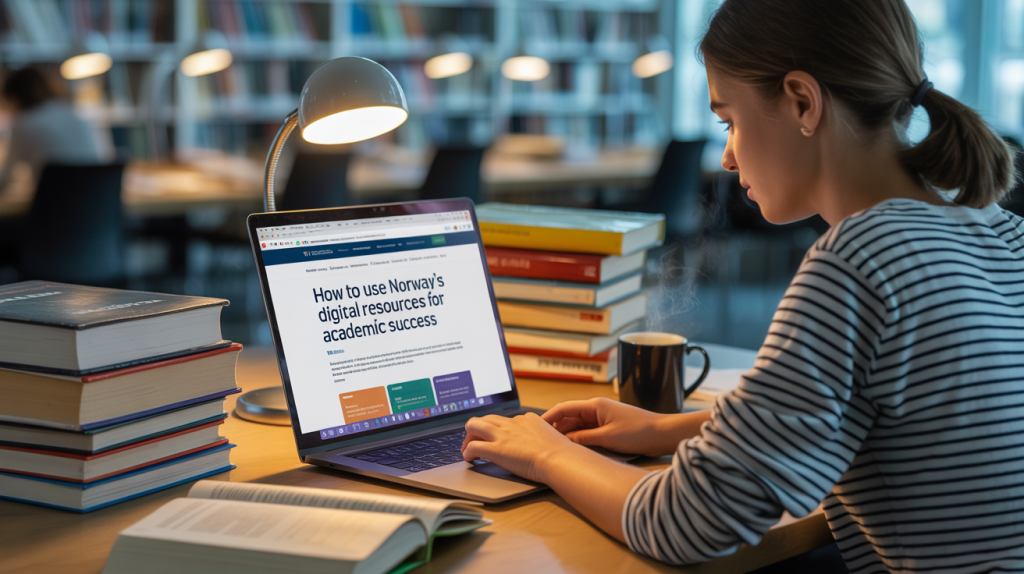How to Use Norway’s Digital Resources for Academic Success
Norway’s Digital Learning Environments and Tools
Norwegian higher education institutions have embraced a comprehensive digital transformation, establishing robust platforms that support teaching, learning, and assessment across disciplines. These tools facilitate flexible study modes — both online and hybrid — which is crucial for international students balancing geographical and time-zone challenges.
Key Features of Digital Learning Platforms
- Centralized Access to Course Materials: Students can easily retrieve lectures, reading materials, and multimedia content anytime, supporting self-paced learning.
- Interactive Learning Experiences: Incorporation of forums, quizzes, and collaborative digital workspaces encourages active student participation.
- Assignment Submission and Feedback: Streamlined digital workflows allow students to submit assignments online and receive timely feedback, enhancing academic performance.
By integrating digital skills within curricula, Norwegian institutions also prepare students for contemporary workforce demands. This emphasis on digital competency ensures that graduates not only excel academically but are also well-equipped for professional environments where technology plays a pivotal role.
Access to Open Educational Resources (OER)
A core pillar of Norway’s digital strategy is the production and dissemination of Open Educational Resources (OER). These freely accessible learning materials significantly enrich the academic experience by providing supplementary content that students can adapt to their individual study needs.
Advantages of OER in Norwegian Higher Education
- Wide Availability of Digital Textbooks and Lecture Recordings: These materials complement traditional coursework, allowing students to revisit complex topics outside the classroom.
- Reusable and Adaptable Learning Tools: Students can tailor resources such as problem sets and case studies to deepen their understanding and foster critical thinking.
- Centralized Platforms Under Development: Norway is advancing centralized digital repositories to simplify access and sharing of educational content across universities and faculties.
For recruitment agencies and admissions teams, highlighting Norway’s commitment to open resources can be a decisive factor for prospective students seeking comprehensive academic support.
Digital Exams and Assessments: Enhancing Flexibility and Integrity
Norway is recognized for its pioneering approach to digital examinations, utilizing secure platforms that uphold academic rigor while providing flexibility.
Features of Norway’s Digital Exam Systems
- Flexible Scheduling and Submission: Digital platforms allow students to take exams remotely or in controlled environments, accommodating diverse needs.
- Maintained Academic Integrity: Sophisticated security measures prevent cheating and ensure the credibility of assessment outcomes.
- Clear Guidelines and Continuous Feedback: Students benefit from transparent procedures and prompt instructor feedback that fosters ongoing learning.
These innovations alleviate traditional exam-related stressors — particularly important for international students adjusting to new academic systems — and contribute to higher success rates.
Strategic Support and Quality Assurance
The Ministry of Education and Research, along with Norwegian institutions, has devised clear digitalization strategies to sustain quality and promote innovation in higher education.
Ongoing Initiatives Include:
- Developing New Digital Solutions: Encouraging collaborative innovation among universities to meet evolving educational demands.
- Fostering a Culture of Digital Competence: Integrating training programs that enhance both student and faculty capabilities.
- Ensuring Quality and Accessibility: Monitoring the effectiveness of digital tools to guarantee an equitable learning environment.
For HR and marketing professionals within education, these strategic goals reflect Norway’s leadership and commitment to academic excellence, an important narrative when attracting international students.
Practical Steps for International Students to Maximize Digital Resources
International students can boost their academic success by proactively engaging with Norway’s digital infrastructure. Here are actionable strategies:
- Engage Regularly with Digital Platforms: Consistent use of learning management systems (LMS) for coursework, group discussions, and communications builds familiarity and academic confidence.
- Utilize Open Educational Resources: Supplement your studies by exploring textbooks, video lectures, and practice exercises available through institutional portals.
- Prepare for Digital Exams: Understand the functionalities and requirements of digital exam systems through tutorials and practice sessions provided by universities.
- Participate in Digital Skills Workshops: Attend training sessions offered by your institution to enhance proficiency in navigating digital tools effectively.
Adopting these practices not only improves academic outcomes but also cultivates marketable digital literacy skills beneficial for future employment.
Take the Next Step with Study in Norway
Leveraging Norway’s extensive digital resources is essential for international students aiming to excel academically while adapting to new educational and cultural environments. Institutions, recruiters, and agencies play a pivotal role in guiding students to utilize these tools effectively, ensuring a successful academic journey.
If you are involved in international recruitment, university admissions, or educational technology and want to learn more about integrating Norway’s digital education offerings into your strategies, contact Study in Norway today. Partner with us to enhance your outreach and provide students with unparalleled access to one of the most digitally advanced higher education systems in the world.

